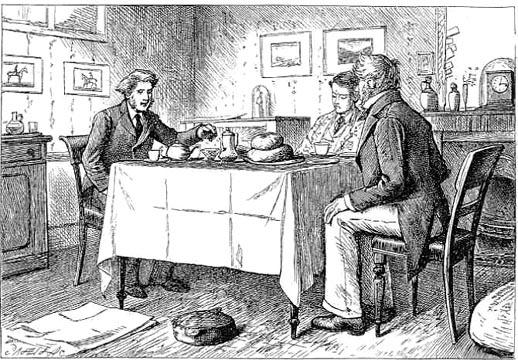Chapters
Dickens has become known as a master storyteller and an icon of Victorian Britain. His books bring us a picture of what life was like at the time when he was working, as well as some of the most important documents of social life at the time.
A prolific writer, Dickens had themes that ran through many of his books, including this one. In order to properly analyse Great Expectations during your GCSE studies, you will need to pick up on these themes and explain some of the ways in which the author is exploring wider issues of the time, or even framing things in a new light.


Context of Great Expectations
Great Expectations by Charles Dickens is firmly rooted in the social, economic, and cultural context of Victorian England. The novel, serialised between 1860 and 1861 and later published as a complete work, provides a vivid portrayal of the societal issues and transformations occurring during this era. Dickens uses the characters, plot, and themes to offer a critical commentary on the challenges and contradictions of Victorian society.
The 19th century witnessed rapid industrialisation and urbanisation. Cities grew, and there was a shift from agrarian to industrial economies, leading to significant social and economic changes, often a part of the work of Dickens.
The Victorian era was marked by British imperial expansion, with the British Empire reaching its peak of power, something that you will read about in history lessons and that ties closely with the literature of the time. Colonialism and imperialism influenced the national psyche and impacted economic, political, and social structures.
Let's delve deeper into the exploration of each theme in "Great Expectations" by Charles Dickens, providing additional examples and quotes:
Social Class and Class Mobility
Dickens vividly portrays the stark social divisions of Victorian England through our protagonist, Pip. Pip's journey from a humble background to the upper echelons of society highlights the societal expectations and prejudices associated with different classes.
Pip's interactions with Joe after his social ascent demonstrate the strain on their relationship due to class differences. Pip's embarrassment about Joe's lack of refinement reflects the societal pressures he faces.
“I wanted to make Joe less ignorant and common, that he might be worthier of my society.”
This is a quote from Pip. Note how the quote of “my society” suggests a certain attitude of ownership or even entitlement, as well as describing Joe as ignorant and common.
Dickens explores the fact that what is perceived as rising in social class may not be an improvement.
Ambition and Self-Improvement
The theme of ambition is embodied in Pip's desire to elevate his social standing. Dickens explores the consequences of unchecked ambition, questioning the true nature of self-improvement.
Pip's obsession with becoming a gentleman and his disdain for his humble origins exemplify the allure of societal advancement and the internal conflicts arising from these aspirations. Dickens seems keen to point out that this is not necessarily a positive thing:
And now, because my mind was not confused enough before, I complicated its confusion fifty thousand-fold, by having states and seasons when I was clear that Biddy was immeasurably better than Estella, and that the plain honest working life to which I was born, had nothing in it to be ashamed of, but offered me sufficient means of self-respect and happiness.
Morality and Redemption
Dickens intricately examines the moral growth and redemption of characters, particularly Magwitch. Magwitch's transformation from a convict to a compassionate figure emphasises the possibility of redemption even in the harshest circumstances.
Magwitch's selfless acts, such as secretly financing Pip's education, highlight the redemptive power of compassion and challenge societal perceptions of morality. Magwitch reveals the depth of his paternal feelings toward Pip:
Look’ee here, Pip. I’m your second father. You’re my son—more to me nor any son. I’ve put away money, only for you to spend.
Love and Relationships
Dickens explores the complexities of love and relationships in a society driven by societal expectations, and how some of the pursuits of love can be shallow. Pip's unrequited love for Estella and Joe's unwavering affection offer contrasting perspectives on the nature of love.
Estella's inability to love, shaped by Miss Havisham's manipulations, becomes a poignant exploration of the theme of love as a societal construct.
Revenge and Forgiveness
The theme of revenge is embodied in Miss Havisham's desire for vengeance. Dickens examines the destructive nature of holding onto past grievances and contrasts it with the theme of forgiveness prevailing over vindictiveness.
Pip's realisation that revenge does not bring satisfaction, coupled with Miss Havisham's tragic end, underscores the novel's commentary on the consequences of a life wasted harbouring revenge. Miss Havisham pleads:
Break their hearts, my pride and hope, break their hearts and have no mercy.
Growth and Self-Discovery
Pip's quest for identity and self-discovery forms a central theme. His journey from a simple boy to a gentleman and back to his roots represents a profound exploration of personal identity.
Pip's realisation that wealth and social status don't define him encapsulates the theme of self-discovery and the importance of staying true to oneself. Pip discusses the concept of his true identity:
“No varnish can hide the grain of the wood; and that the more varnish you put on, the more the grain will express itself.”
Guilt and Redemption
The book being set over such a long period of time gives a unique story arc involving redemption for many characters.
Characters grapple with guilt, and Dickens explores the possibility of redemption through sincere remorse and positive actions. Pip's reflections on his treatment of Joe and Biddy exemplify this theme.
Pip's acknowledgment of his mistakes and attempts at redemption, particularly in assisting Magwitch, underscore the transformative power of guilt and the potential for personal growth.
Crime
The character of Magwitch in particular explores crime, but there are many other ways in which crime is at the centre of the story.
Dickens seems to try to point out the fact that the issues of crime are never really solved in Victorian Britain, and that many criminals end up back in the same habits with no chance of progressing and reintegrating.
"I am not a-going fur to tell you my life, like a song or a story-book. But to give it you short and handy, I'll put it at once into a mouthful of English. In jail and out of jail, in jail and out of jail, in jail and out of jail. There, you got it. That's my life pretty much." – Magwitch
Charles Dickens' exploration of these themes is pretty typical of his work. It elevates Great Expectations beyond a narrative, turning it into a profound commentary on human nature, societal expectations, and the intricate interplay of individual choices in shaping destiny. Each theme resonates with readers across time, making the novel a timeless exploration of the human experience.
Summarise with AI:













